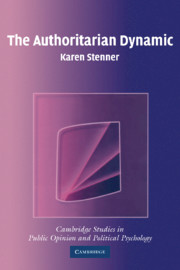Book contents
- Frontmatter
- Contents
- List of Tables
- List of Figures
- Acknowledgments
- 1 Introduction: The Authoritarian Dynamic
- 2 Kindred Spirits, Common Spark: The Theory of the Authoritarian Dynamic
- 3 Manipulating Threat and Reassurance: Data and Methods
- 4 The Authoritarian Dynamic and the Politics of Fear: Putting the Pieces of the Puzzle Together
- 5 Authoritarianism and Conservatism across Cultures
- 6 Authoritarianism and Conservatism: How They Differ and When It Matters
- 7 One True People: Putting a Face on the Theory
- 8 One Right Way: Fleshing Out the Portrait
- 9 Manning the Barricades: Racism and Intolerance under Conditions of Normative Threat
- 10 The Authoritarian Dynamic: Implications
- Bibliography
- Index
- Titles in the series
8 - One Right Way: Fleshing Out the Portrait
Published online by Cambridge University Press: 05 June 2012
- Frontmatter
- Contents
- List of Tables
- List of Figures
- Acknowledgments
- 1 Introduction: The Authoritarian Dynamic
- 2 Kindred Spirits, Common Spark: The Theory of the Authoritarian Dynamic
- 3 Manipulating Threat and Reassurance: Data and Methods
- 4 The Authoritarian Dynamic and the Politics of Fear: Putting the Pieces of the Puzzle Together
- 5 Authoritarianism and Conservatism across Cultures
- 6 Authoritarianism and Conservatism: How They Differ and When It Matters
- 7 One True People: Putting a Face on the Theory
- 8 One Right Way: Fleshing Out the Portrait
- 9 Manning the Barricades: Racism and Intolerance under Conditions of Normative Threat
- 10 The Authoritarian Dynamic: Implications
- Bibliography
- Index
- Titles in the series
Summary
By my account, authoritarianism is a fundamental predisposition concerned with minimizing difference, and constraining the individual freedom that tends to surround and confront us with different people, beliefs, and behaviors. It should dispose authoritarians and libertarians to widely varying reactions to racial diversity, political dissent, and moral deviance. That being so, the responses of our authoritarian and libertarian subjects ought to be spontaneously and readily distinguishable along these lines as, with very minimal prompting and guidance from their interviewers, they answer rather broad questions regarding themselves; their lives; their hopes, fears, and pride; and their feelings about race, politics, and morality (see Table 7.1). That is to say, even structured to the least degree possible by my preconceived notions, the content of these (approximately) natural conversations should, if I am correct, reveal stark differences between the authoritarian and libertarian subjects in the manner in which they think and feel about racial diversity, political dissent, and moral deviance.
In this chapter, then, I examine the actual content of the in-depth interview discussions, dealing in turn with each of these three dimensions of racial, political, and moral intolerance. In each domain, I will report upon the size and consistency of any differences manifested between the authoritarian and libertarian subjects in their propensity to subscribe to certain ideas or to express certain beliefs about the world.
- Type
- Chapter
- Information
- The Authoritarian Dynamic , pp. 239 - 268Publisher: Cambridge University PressPrint publication year: 2005



